#sporadic stories | writing
Text

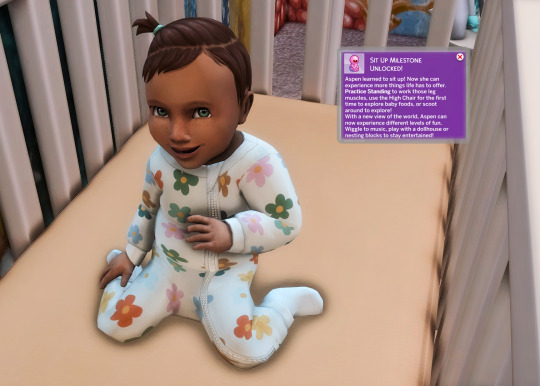


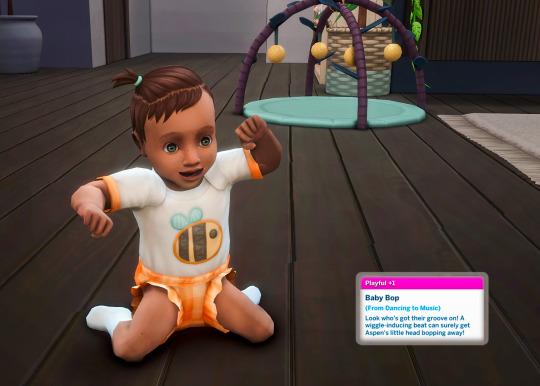
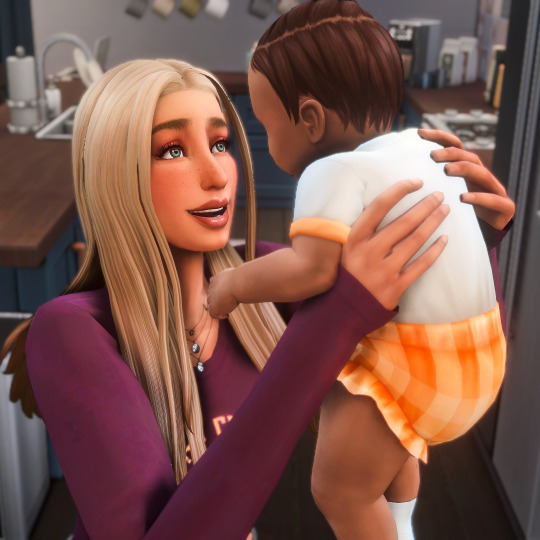
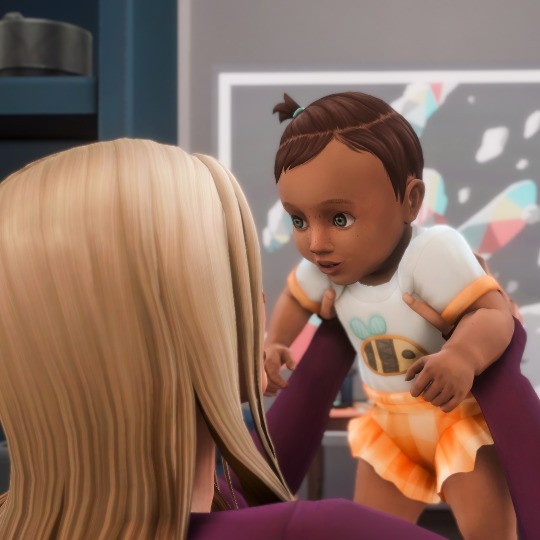
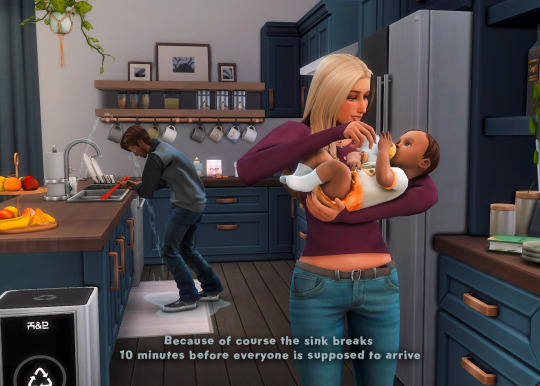
Prev // Next
#posts might be a little sporadic this week and next#slowly getting back into things after being sick#i need to get organized and get back to writing#been enjoying a lot of gameplay with aspen tho#she's so precious I can't take it#she'll dance all day with dawn if I let her lol#gif warning#ts4#ts4 simblr#ts4 story#sims 4#sims 4 storytelling#sims 4 challenge#starsignchallenge#starsignlegacychallenge#gen1 aries#aries pt3#phoenix realta#dawn stephens#aspen realta
76 notes
·
View notes
Text
Take back the mountain
Chapter 1: Comply
Welsknight has a very rough time in captivity
Story summary
Everyone is happy in Hermiton. Why wouldn’t they be? Every day is a great day. A beautiful day, surrounded by friends.
Except it isn't, and Impulse takes what little knowledge he has to the Hermits who have managed to escape Hermiton since its inception. Fearing that Xisuma (under the influence of Evil X) has planned something big that would endanger all Hermits, it's up to those who are not caught in that haze of bliss to finally put an end to this madness and save their friends.
(How curious. How easily drawn back in.)
#hermitcraft s8#impulsesv#tangotek#xisuma#evil x#welsknight#helsknight#bdubs#geminitay#falsesymmetry#new story old series#part of a series but it's a short one#this is like the fourth part of the series it is not recommended to jump in blind because you won't understand what's going on#updates will be sporadic (i.e. when the chapters are finished)#capricious writings
26 notes
·
View notes
Text
Fuck it if this site implodes I’m still posting about my OC’s somewhere. I’ll go back to quotev if need be
#/hj#forreal I don’t know where. I can post the way I do in terms of creative stuff#I like being able to share random thoughts of my oc’s whenever I like#and I like not having to post a whole cohesive story but rather whatever I feel like writing#I don’t think we could transfer all this over to AO3 and honestly I don’t want to I just know that’s how other people save their stuff#I like being able to post sporadically#anybody think a bake sale could raise enough money to buy tumblr/j
7 notes
·
View notes
Text
some of the “tell us more about this character or that aspect of the world” asks i’ve received in the past few months are SO good, i am on the edge of my seat to draw and write responses to them, i have them like, planned, i just gotta wait till january to get started
also as an aside, bc two new people have asked: yes, i am still making that
“veri help, the OCs i made to be evil villains never stay evil, they inevitably slide into antihero territory at worst, why does this happen and how do i keep this from happening so i can have at least one ACTUAL villain running around” writing advice guide, it just got away from me a bit and needs some streamlining so it isn’t basically a long winded youtube video essay without the actual youtube video
#sporadic warbling#i mean i guess i COULD make it a video essay#but let's not tempt fate and also not force me to make rebus talk sprites#rebus: i'm gona do it#everyone: NO DONT PLEASE#rebus: *folds their arms*#everyone: NOOO#that said the most extremely simplified answer is:#how your brain will engage with an OC that is ultimately a toy in an evershifting sandbox#will be much different then how you are forced to write them in an actual concrete story#which a lot of people are often reluctant to admit they are not Actually making#but it does go deeper that that and what causes the different panning out is what i'll be getting into
43 notes
·
View notes
Note
💕 self-love time! talk about which ones of YOUR creations (edits, artworks, fanfics) you like the most then send to other creators to do the same 💕
*tacklehugs!!* TEA, THIS MADE ME VERY HAPPY TO SEE IN MY INBOX ;u; <33
okay OKAY I want to talk about this new original story idea i'm writing. specifically the main character, who is a changeling, aromantic lawyer who works in the city and has very little time for relationships, of any sort. channeling my workaholic nature? perhaps
now in this verse, the fae have integrated into society, like any other supernatural / magic user. they're long lived, with their own courts and laws. changelings are rare in modern days, and mostly accidents? /sects of fae that operate outside of modern society.
all of this to say, it is a very isolating existence. not human, so that they feel like an outsider growing up, but too human for fae society.
this story is gonna be about a connection with a pair of mated shifters, that yes, starts off as a hook up, but turns into a found family, deep friendship sort of affair. basically a heck of a lot of smut with a bucket load of supernatural lore thrown in.
and did I mention werecats? >:3
#GOOD MORNING#ej writes werewoofs#technically hehehe#ropes and fangs#-verse#I will sort out my tags eventually#so i've been thinking about whether my ace is really aroace#as I'm fucking great at friendships#and with all my actual relationships I've always felt more comfortable with them as friendships instead#so what better medium to explore those thoughts than writing?#there is more plot here that I'm not talking about#as I'm still trying to figure out what I'm gonna do with these stories - self publish? hit up that indie queer publisher in portland again?#idek#self publishing is a tough game and i'm not sure I'm ready for that#I write TOO SLOW#and too sporadically for that
14 notes
·
View notes
Text
i made a post entertaining the Alice-Karen theory before and i still don't know where i stand on believing it. i thought it was a complete crack theory that's just straight up disprovable by canon going into it but the insane number of odd things somehow supporting it, which i apparently never payed attention to before rewatching s4, weird me out (you can also extend it back to further seasons if you genuinely want to buy into it)
i really don't like the "and they're Related!" twist usually so i don't have a particular bias towards the theory being true. but i wanted to check it out for fairness sake to give it a chance (personal preference aside) and now i don't know what i think anymore. it's like. there's some very good arguments you can make against it. but there's also a weird amount of things that DO imply something is going for which we don't have an explanation for yet
but no matter if Karen is actually Alice
i do genuinely believe something was incomplete about Both the flashbacks to the Creel murders we saw. Victors AND Henry's version. because the story we're ultimately shown by Henry makes sense on a surface level but it also directly contradicts the timeline of events it's trying to lay out to us. Henry is either specifically leaving something out when talking to Nancy that would explain the hole in the timeline he subtly leaves OR Henry is Also an unreliable narrator because he genuinely thinks he's telling the true story like Victor did as well
i'm quite ambivalent to the Wheeler-Creel theories but i DO have thoughts on it after looking into it (i'm going to actually make posts about that at some point. arguing for and against it probably). but regardless of whether Karen is actually Alice. Something is sure going on with Alice Creel. even if she ends up being a random girl, s4 was definitely not the last we heard about her with the story we were left
#i seriously need to write an actual post about the timeline fuckery of Henry's recounting of events#because he's either lying intentionally or unaware of something because the chain of events he shows Nancy isn't actually possible#in the order he presents it#and it's not just a pretty significant gap in his timeline but also the way Henry tells us what he did while the events on screen make#what he says... very unlikely to be the full story. you're leaving shit out Henry. Again#actually given the fact that i'm not the Biggest fan of the Creel/Wheeler theory i have WAY too many notes on it#i thought i'd keep an open mind on a s4 rewatch and it spiraled into WAY too many notes i still don't even love the theory that much#but at this point i'm at least trying to be prepared if s5 actually goes there#because with the way things have been set up that theory is either real or supposed to clown on the audience with all the things hinting at#it being intentional misleads for laughs- there's just too many odd choices made and too many things that you can tie into it#alice creel#karen wheeler#creel/wheeler theory#<- there finally made a tag to find these posts i keep sporadically being weird about it so at least i can keep track of the shit i've#actually made posts about
24 notes
·
View notes
Text
i'm developing an absolutely fascinating cadre of OCs for an original writing project that will never see the light of day. what if a family was gay lithuanian måneskin, a former k-pop trainee, an honest to god barbershop quartet, irish lesbians engaging in undernegotiated polyamory with someone from gay lithuanian måneskin, and a journalist. what then
#shispeak#and then there are my OCs from original writing project number one#who i dreamt up in 2018 and have developed sporadically for i guess five years now (fucked up)#but that story is slightly less about found family and slightly more about 'what if tortall had atla magic rules' and political intrigue#and the Outsiders crew are just more on the brain tonight
2 notes
·
View notes
Note
Would you ever write a series about shouto bringing a girl to all these family functions and touya falling in love with her and basically taking her from shouto? I guess its kinda along the same plot as bmb with angst but obv touya and shouto aren’t sharing and obv touya always wins
i actually kindaaaa have a series i’ve started writing that runs along those lines (that i’ve been calling the ‘shouto-centric series’) in a really basic sense except touya doesn’t win for once (*/ω\*) it gets very dark ahaha but i don’t wanna spoil it any further SO to answer your question: yes, kind of!
#it’s just something i work on very slowly and sporadically#i get a burst of ideas for it every lil bit and frantically write them down or write bits and pieces of scenes#but the main and basic story structure is already decided#it’s all those fun lil details that need to be fleshed out hehe <3#hope ur having a fab day anon!!#pls stay safe and drink water!#inky.bb#clari gets mail
3 notes
·
View notes
Text
Last Line Tag
Tagged by @oh-no-another-idea--thanks for the tag!
So, uh...this WIP doesn’t actually have a name right now (it’s just named as ‘The Found Family Stays Together AU’ in my documents, but that’s not...really a title...), and it’s very sporadic right now, haha, but this is the last line I have:
“You don’t mind? I can go find something else to do if you want to be alone for a while.”
I’ll leave this as an open tag! If you have something you’d like to share, then feel free to say I tagged you.
#tag game#last line tag game#this is...probably the most self-indulgent story i've written#or i guess set of stories haha#like i said: very sporadic#it...might not be something i ever post#(just because it IS so self-indulgent)#but. you know. it's still fun to write
3 notes
·
View notes
Text
i’ve been thinking about where exactly I wanna take this account, and I’ve decided I want this to be a casual thing with no big “plan” in mind, like a fic or comic or anything. For now at least.
…Basically, I’m just gonna keep doing things the way I have been. An assortment of posts whenever the mood strikes. From lore bits, to character designs, character interaction scenes, dialogue snippets… stuff like that. Just without the promise of something “substantial” coming from it.
So, nothing’s changing! I’m not deleting, I havent dropped all interest off a cliff, nothing like that. I just have a lot of other priorities, to where I doubt I could really cobble anything uniform together here. So yanno, un-cobbled bits it is.
#text post#as cool as it was to think of this as some full-fledged story to start writing… im like. i dont think i can spare all the time#without adding stress of ‘i gotta release this chapter soon & have the story fully planned & character designs for illustrations and—‘#like thats the LAST thing i want this AU to be for me. its all just casual fun here. sporadically yeah but we’re chillin.
1 note
·
View note
Text
i've been editing this story all day but i think i've finally hit a snag
#i've been trying to iron out the story like the timeline and sequence#but half of the things that should be in the master draft are actually sporadically sprinkled through the scrap file#because sometimes i can't write in the master draft because my brain won't let me so i just write in the scrap file all out of order#so the way i have it in the master draft is an old version#but the new version i could find in the scrap file isn't what i thought it was either???#is there a third one#the scrap file is 20000 words
5 notes
·
View notes
Text
time to rewrite act 2 for the fourth time
#guys.... i think writing might be hard#lol#and i guess that means i should rewrite some things in act 3 too#im sorry to any hs act 2 fans out there but man#its not my favorite haha#sometimes i forget that this is my own story and i can write whatever i want#also im kind of thinking of doing reader commands for a few upd8s#it would be sporadic but i think it would be fun to do sometimes#mainly when im running out of ideas lol
2 notes
·
View notes
Text
Any well-versed Warrior Cats artist/writer willing to check my vocabulary for Warrior Cat terminology? I'm getting information online that's helpful for my WC story, but I want to make sure I'm using terms correctly
I won't be sharing an entire chapter with these words, just bits and pieces that are relevant (for example in chapter 1, one of the main characters is a mother cat and about halfway through the chapter, she uses her son's name (Quickstep), but anyone under 6 moons are supposed to have the "-kit" suffix, correct?)
#I will only be sharing things once I finish chapters#I plan to write most if not the entire story before I post it online so sharing will be sporadic#warrior cats
2 notes
·
View notes
Text
i've been really onto something with the sporadic 10-minute writing sprints honestly. since i started doing them a week and a half ago my piece is already 7k and there have been more days where i've written nothing at all than i thought would get me to 7k. turns out age-old writing tactics actually work...who'd've thunk
#now is that 7k amazing? no but i'm heartily embracing the ugly first draft#like 1) that post about how writing is the process of thinking not the other way around#and 2) repetitive practice makes perfect. insert story about pottery class where half were graded on quality and half on quantity#and the ones graded on quantity made better quality items than the ones who spent forever agonizing over 1 item's quality#so yeah.....sometimes the writing is sporadic or deeply lacking in description but sometimes i'll spend the first 10 mins or so#going back JUST 3 or 4 paragraphs and fleshing out what feels rushed and thin before i forge ahead#like realizing i entirely forgot to describe what characters look like LMAO bc in my mind i know....#anyway its been fun i wanna get this piece to 60k/finished by end of oct and i think i can do it if i just stick w the writing sprints#genuinely like. i used to think about Being An Author being My Job and being like thats so stupid bc i cant make myself#sit and write for 3 or 4 hours a day#well no stupid of course you can't write for 4 hours in a row (unless its wsnxx madness moments) but you can write for 4 hours in#15-minute portions whilw doing other productive things between.....smh at myself for being this dumb for this long. but im smart now. so.#t
4 notes
·
View notes
Text
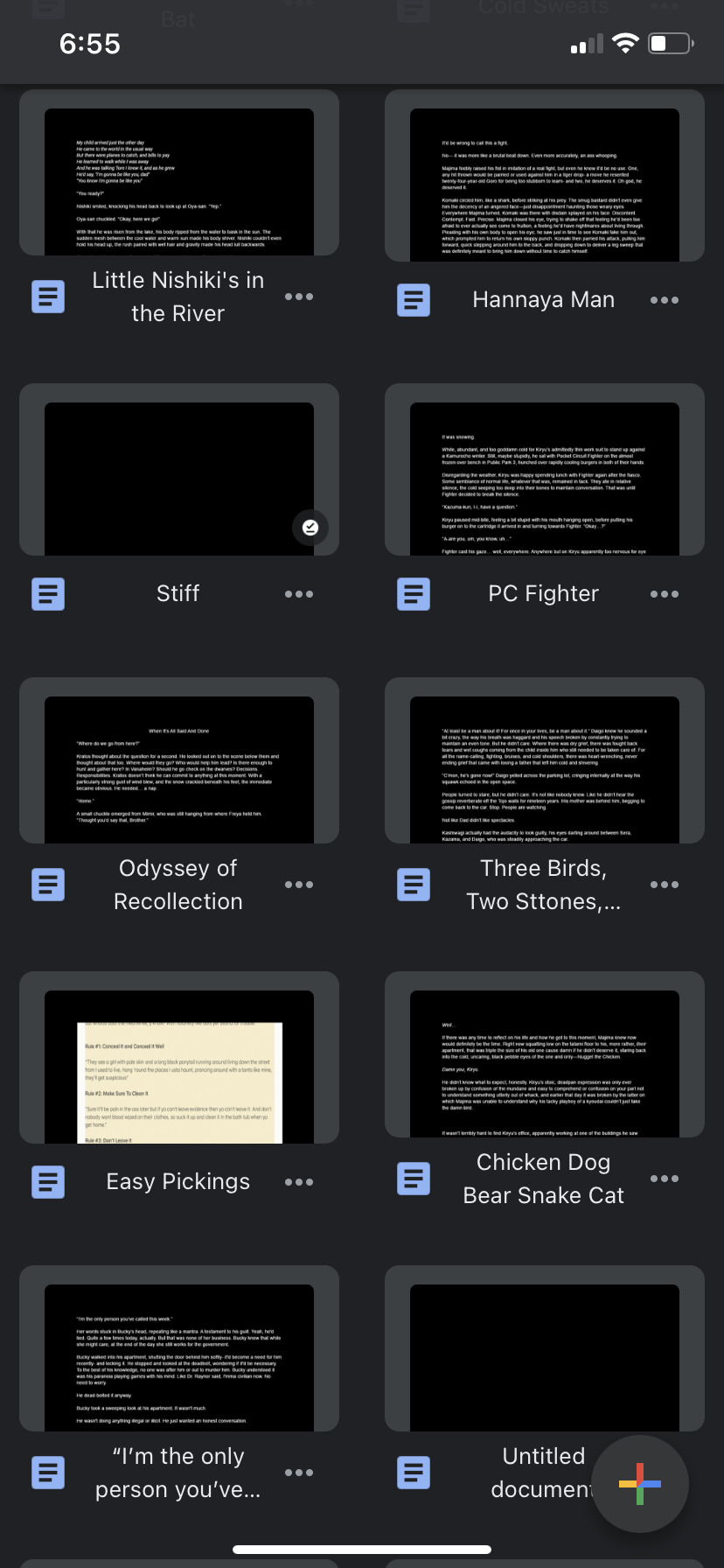
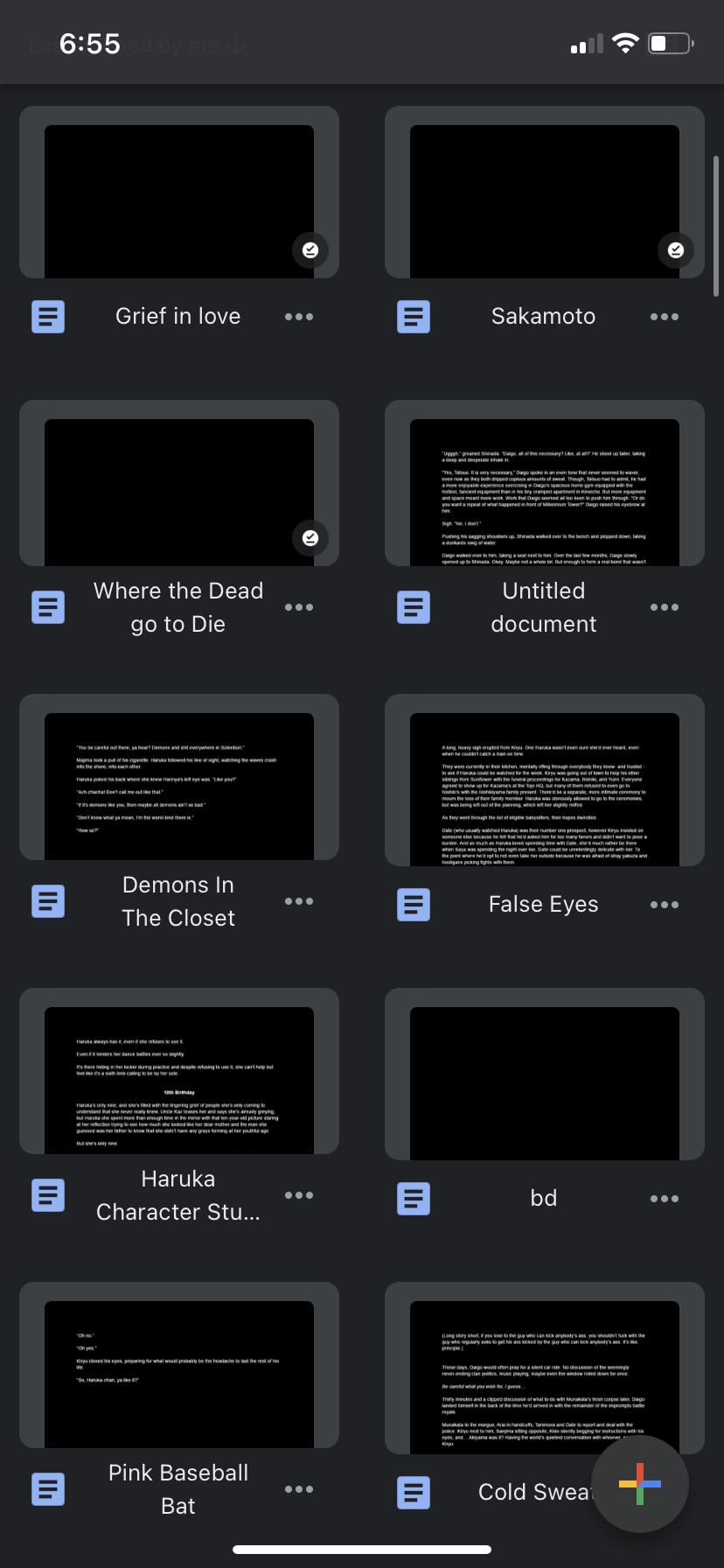
Btw these are some of the things I’ve been writing since.. idk. Cause sometimes I mention writing but realized I haven’t posted to Ao3 in forever.
#mine#tbh it’s because I was in major slump and I can only really write in sporadic bursts before I get anxious that I’m not writing well#there’s a few first chapters I wanna post so badly but like they ain’t ready#also the blank spaces are where I’ve physically moved the story down so I write the beginning freely without the rest complicating my-#-thought process#titles are pending lmao#i mean who wouldn’t want to read chicken dog bear snake cat lmao
0 notes
Text
Pacing your Story (Or, How to Avoid the "Suddenly...!")
Arguably *the* most important lesson all writers need to learn, even for those who don’t give a damn about themes and motifs and a moral soap box: How your story is paced, whether it’s a comic book, a children’s chapter book, a doorstopper, a mini series, a movie, or a full-length season of TV (old school style), pacing is everything.
Pacing determines how long the story *feels* regardless of how long it actually is. It can make a 2 hour movie feel like 90 mins or double the time you’re trapped in your seat.
There’s very little I can say about pacing that hasn’t been said before, but I’m here to condense all that’s out there into a less intimidating mouthful to chew.
So: What is pacing?
Pacing is how a story flows, how quickly or slowly the creator moves through and between scenes, how long they spend on setting, narration, conversation, arguments, internal monologues, fight scenes, journey scenes. It’s also how smoothly tone transitions throughout the story. A fantasy adventure jumping around sporadically between meandering boredom, high-octane combat, humor, grief, and romance is exhausting to read, no matter how much effort you put into your characters.
Anyone who says the following is wrong:
Good pacing is always fast/bad pacing is always slow
Pacing means you are 100% consistent throughout the entire story
It doesn’t matter as much so long as you have a compelling story/characters/lore/etc
Now let me explain why in conveniently numbered points:
1. Pacing is not about consistency, it’s about giving the right amount of time to the right pieces of your story
This is not intuitive and it takes a long time to learn. So let’s look at some examples:
Lord of the Rings: The movies trimmed a *lot* from the books that just weren’t adaptable to screen, namely all the tedious details and quite a bit of the worldbuilding that wasn’t critical to the journey of the Fellowship. That said, with some exceptions, the battles are as long as they need to be, along with every monologue, every battle speech. When Helm’s Deep is raging on, we cut away to Merry and Pippin with the Ents to let ourselves breathe, then dive right back in just before it gets boring.
The Hobbit Trilogy: The exact opposite from LotR, stretching one kids book into 3 massive films, stuffing it full of filler, meandering side quests, pointless exposition, drawing out battles and conflicts to silly extremes, then rushing through the actual desolation of Smaug for… some reason.
Die Hard (cause it’s the Holidays y’all!): The actiony-est of action movies with lots of fisticuffs and guns and explosions still leaves time for our hero to breathe, lick his wounds, and build a relationship with the cop on the ground. We constantly cut between the hero and the villains, all sharing the same radio frequency, constantly antsy about what they know and when they’ll find out the rest, and when they’ll discover the hero’s kryptonite.
2. Make every scene you write do at least two things at once
This is also tricky. Making every scene pull double duty should be left to after you’ve written the first draft, otherwise you’ll never write that first draft. Pulling double duty means that if you’re giving exposition, the scene should also reveal something about the character saying it. If you absolutely must write the boring trip from A to B, give some foreshadowing, some thoughtful insight from one of your characters, a little anecdote along the way.
Develop at least two of the following:
The plot
The backstory
The romance/friendships
The lore
The exposition
The setting
The goals of the cast
Doing this extremely well means your readers won’t have any idea you’re doing it until they go back and read it again. If you have two characters sitting and talking exposition at a table, and then those same two characters doing some important task with filler dialogue to break up the narrative… try combining those two scenes and see what happens.
**This is going to be incredibly difficult if you struggle with making your stories longer. I do not. I constantly need to compress my stories. **
3. Not every scene needs to be crucial to the plot, but every scene must say something
I distinguish plot from story like a square vs a rectangle. Plot is just a piece of the tale you want to tell, and some scenes exist just to be funny, or romantic, or mysterious, plot be damned.
What if you’re writing a character study with very little plot? How do you make sure your story isn’t too slow if 60% of the narrative is introspection?
Avoid repeating information the audience already has, unless a reminder is crucial to understanding the scene
This isn’t 1860 anymore. Every detail must serve a purpose. Keep character and setting descriptions down to absolute need-to-know and spread it out like icing on a cake – enough to coat, but not give you a mouthful of whipped sugar and zero cake.
Avoid describing generic daily routines, unless the existence of said routine is out of ordinary for the character, or will be rudely interrupted by chaos. No one cares about them brushing their teeth and doing their hair.
Make sure your characters move, but not too much. E.g. two characters sitting and talking – do humans just stare at each other with their arms lifeless and bodies utterly motionless during conversation? No? Then neither should your characters. Make them gesture, wave, frown, laugh, cross their legs, their arms, shift around to get comfortable, pound the table, roll their eyes, point, shrug, touch their face, their hair, wring their hands, pick at their nails, yawn, stretch, pout, sneer, smirk, click their tongue, clear their throat, sniff/sniffle, tap their fingers/drum, bounce their feet, doodle, fiddle with buttons or jewelry, scratch an itch, touch their weapons/gadgets/phones, check the time, get up and sit back down, move from chair to table top – the list goes on. Bonus points if these are tics that serve to develop your character, like a nervous fiddler, or if one moves a lot and the other doesn’t – what does that say about the both of them? This is where “show don’t tell” really comes into play.
4. Your entire work should not be paced exactly the same
Just like a paragraph should not be filled with sentences of all the same length and syntax. Some beats deserve more or less time than others. Unfortunately, this is unique to every single story and there is no one size fits all.
General guidelines are as follows:
Action scenes should have short paragraphs and lots of movement. Cut all setting details and descriptors, internal monologues, and the like, unless they service the scene.
Journey/travel scenes must pull double or even triple duty. There’s a reason very few movies are marketed as “single take” and those that are don’t waste time on stuff that doesn’t matter. See 1917.
Romantic scenes are entirely up to you. Make it a thousand words, make it ten thousand, but you must advance either the romantic tension, actual movement of the characters, conversation, or intimacy of the relationship.
Don’t let your conversations run wild. If they start to veer off course, stop, boil it down to its essentials, and cut the rest.
When transitioning between slow to faster pacing and back again, it’s also not one size fits all. Maybe it being jarring is the point – it’s as sudden for the characters as it is for the reader. With that said, try to keep the “suddenly”s to a minimum.
5. Pacing and tone go hand in hand
This means that, generally speaking, the tone of your scene changes with the speed of the narrative. As stated above, a jarring tonal shift usually brings with it a jarring pacing shift.
A character might get in a car crash while speeding away from an abusive relationship. A character who thinks they’re safe from a pursuer might be rudely and terrifyingly proven wrong. An exhausting chase might finally relent when sanctuary is found. A quiet dinner might quickly turn romantic with a look, or confession. Someone casually cleaning up might discover evidence of a lie, a theft, an intruder and begin to panic.
--
Whatever the case may be, a narrative that is all action all the time suffers from lack of meaningful character moments. A narrative that meanders through the character drama often forgets there is a plot they’re supposed to be following.
1K notes
·
View notes